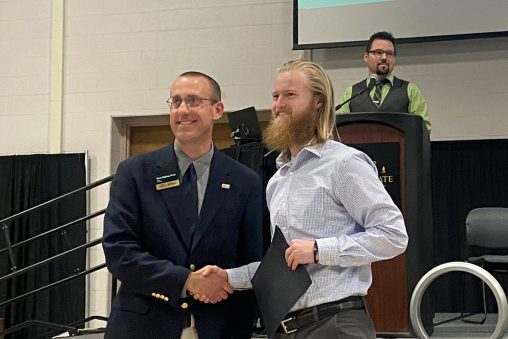
Brian Rigling, dean of the College of Engineering and Computer Science, congratulated mechanical engineering student Daniel Donahue, who was inducted into the Order of the Engineer.
About 50 students from the Wright State University College of Engineering and Computer Science took part in the college’s induction ceremonies for the Order of the Engineer and the Pledge of the Computing Professional on April 29.
The event was conducted by Brian Rigling, Ph.D., dean of the College of Engineering and Computer Science; Travis Doom, Ph.D., associate dean of the college; Kayleigh Duncan, instructor of computer science and engineering; Craig Baudendistel, Ph.D., lecturer of mechanical and materials engineering; and David Kender, senior lecturer emeritus of biomedical, industrial and human factors engineering.
This was the first spring ceremony that included guests since the beginning of the pandemic.
“It was fantastic to return to a fully in-person ceremony for induction into Order of the Engineer and Pledge of the Computing Professional,” Rigling said. “We had not had a complete in-person ceremony since spring 2019, and I think that people were hungry for it. Attendance by students, parents, faculty, and staff was strong. There was a lot of excitement in the room.”
The ceremony was open to all undergraduate students from the College of Engineering and Computer Science who completed their degrees in the Summer or Fall Semesters of 2021 or the Spring Semester of 2022.
The Order of the Engineer is a symbolic organization that seeks to promote professionalism among engineers and graduates of accredited engineering programs. The order is the roster of engineers in the United States who have publicly accepted the “Obligation of an Engineer” while participating in an engineers’ ring ceremony.
The Pledge of the Computing Professional is an organization that promotes computing as a recognized profession at the time of graduation for students in computer science and related programs. The pledge is a rite-of-passage ceremony for graduates of computing programs.
Ashton Williams, who graduated in April with a bachelor’s degree in computer science, said that taking the Pledge of the Computing Professional was important to him because computers have the power to be both a benefit or a hindrance to the welfare of society and that it should be the goal of all computing professionals to make sure that they are a benefit.
Williams began pursuing a master’s degree in computer science at Wright State this summer.

 Wright State names Rajneesh Suri dean of Raj Soin College of Business
Wright State names Rajneesh Suri dean of Raj Soin College of Business  ‘Only in New York,’ born at Wright State
‘Only in New York,’ born at Wright State  Wright State president, Horizon League leaders welcome new commissioner
Wright State president, Horizon League leaders welcome new commissioner  Wright State celebrates homecoming with week-long block party
Wright State celebrates homecoming with week-long block party  Wright State baseball to take on Dayton Flyers at Day Air Ballpark April 15
Wright State baseball to take on Dayton Flyers at Day Air Ballpark April 15 